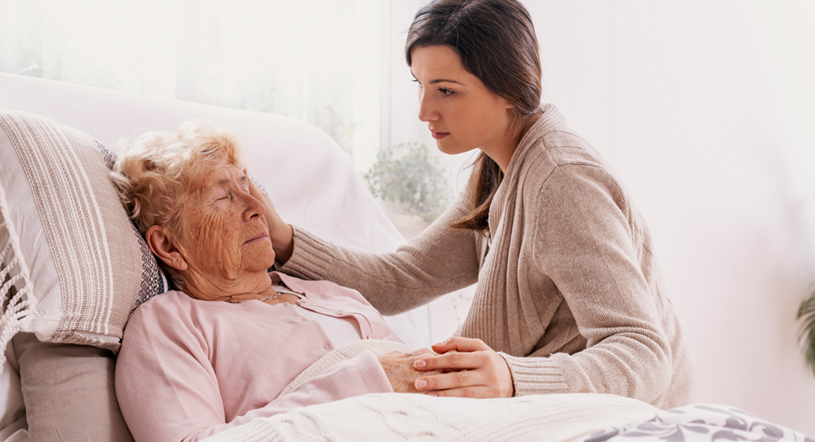A family caregiver’s job is one of love and dedication, but it comes with great responsibility and a fair amount of stress—even under “normal” conditions. Add in the unparalleled concerns associated with a pandemic, and self-care has become imperative for caregivers.

In AARP’s recent report, thirty-six percent of family caregivers characterized their situation as highly stressful. Over time, physical and emotional wear and tear can lead to caregiver burnout—that in turn can cause anxiety and depression for caregivers, and could even put your health and that of your loved one at risk.
Traci Dobronravova, Director of Seniors At Home, says that like anyone who performs a job 24/7, family caregivers risk burnout more often when they do not have any relief.
“Our Seniors At Home caregivers are fortunate to have a support system here,” says Traci. “We have Home Care Supervisors that help to access situations and offer assistance. There is also caregiver relief in shift changes or off days. A family caregiver may not have that.”
Traci encourages family caregivers to watch for signs of burnout and emphasizes that it’s important to take proactive steps to deal with it before it spirals out of control.
Warning signs of caregiver burnout:
- Anger or frustration toward your loved one
- Anxiety about the future and facing another day
- Depression that affects your ability to cope
- Exhaustion that makes it tough to complete your daily tasks
- Health problems, such as getting sick more often
- Inability to concentrate that makes it difficult to do simple tasks
- Irritability and moodiness that may trigger negative responses and actions
- Sleeplessness caused by concerns, lack of downtime, or other factors
The good news is that there are many self-care techniques that caregivers can use to reduce stress. It’s important to find what works for you—below are a few important tips to consider.
Self-care tips for family caregivers:
- Give yourself a break—Ask a friend or relative to fill in for you for a few hours occasionally so you can take a walk, watch a movie or run an errand. If you don’t have that sort of informal support available or feel you need more structured care, respite care is an option.
- Simplify your communication—Keeping family and friends up to date about your loved one’s health individually can be exhausting. Try using a communication website or shared document for easy updates and communication.
- Join a support group—Talking with other family caregivers in a support group setting can lift your spirits and help you think through solutions to various problems.
- Nurture positive relationships—You may be overwhelmed, but take the time to talk with your friends and family members. Spend an evening with someone who is a good listener—talking it out is often very therapeutic.
- Take care of your own health—Set a goal to establish a good sleep routine and to exercise a certain number of hours every week. Make a point to incorporate daily relaxation, even if only for 10 minutes. And remember to eat healthy meals to fuel your body.
These are extraordinary times. It is important for family caregivers to practice self-care in order to protect their own health and to provide the best care for their loved one. If you need additional assistance and support, don’t hesitate to reach out to Seniors At Home—we have been there for many families, and we are here for yours too.
Seniors At Home provides respite care services as well as in-home care.
If you or someone you know needs assistance, reach out to Seniors At Home for a consultation—415-449-3700.
Seniors At Home is a division of Jewish Family and Children’s Services, a trusted nonprofit institution that has been providing care since 1850. Our services are funded by fees and by donations for those who cannot afford the full cost of care for these critical services.
If you would like to make a donation, please contact Barbara Farber at BarbaraF@jfcs.org or 415-449-3858, or give online.